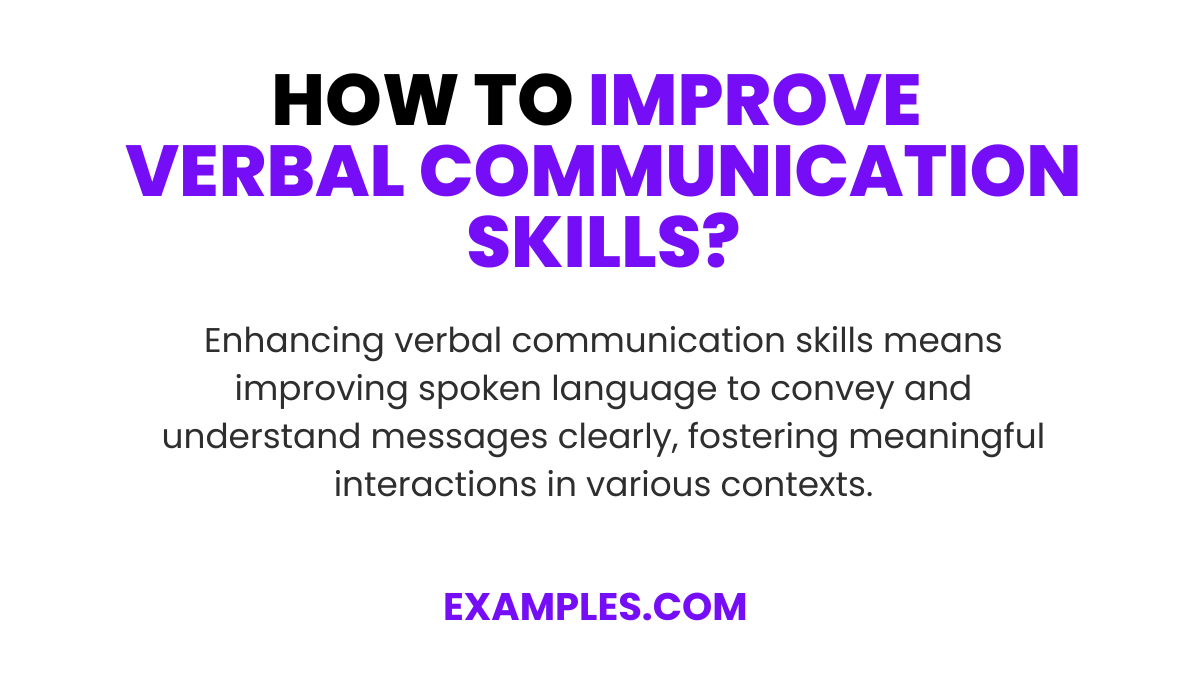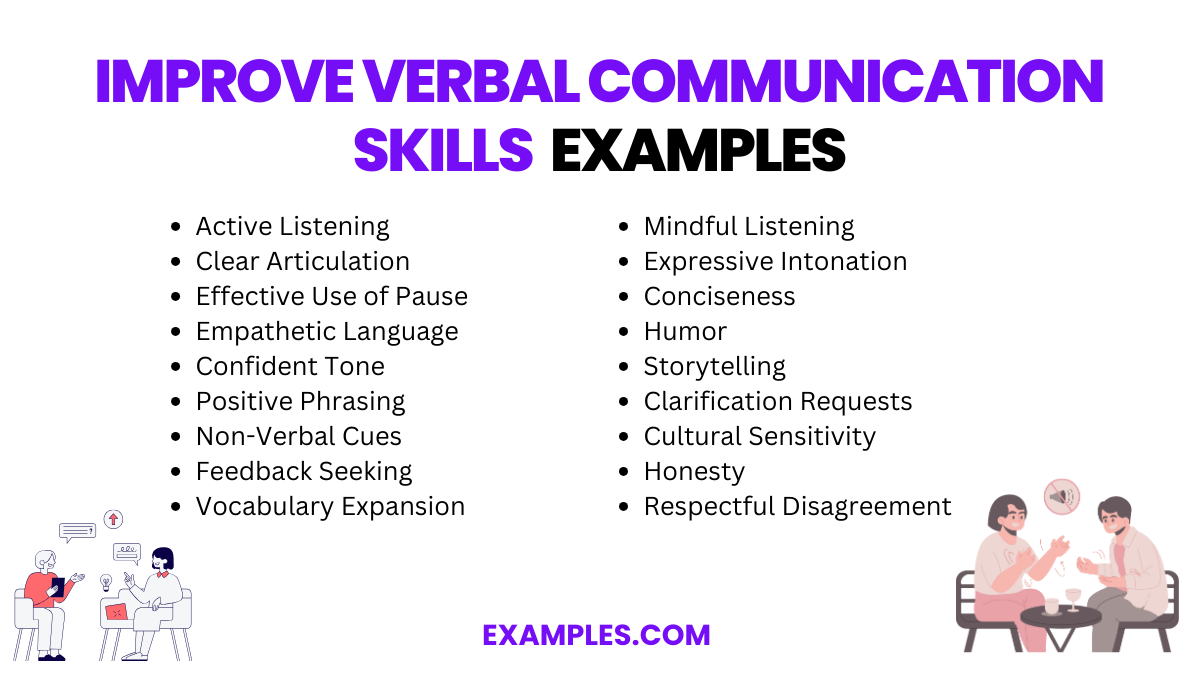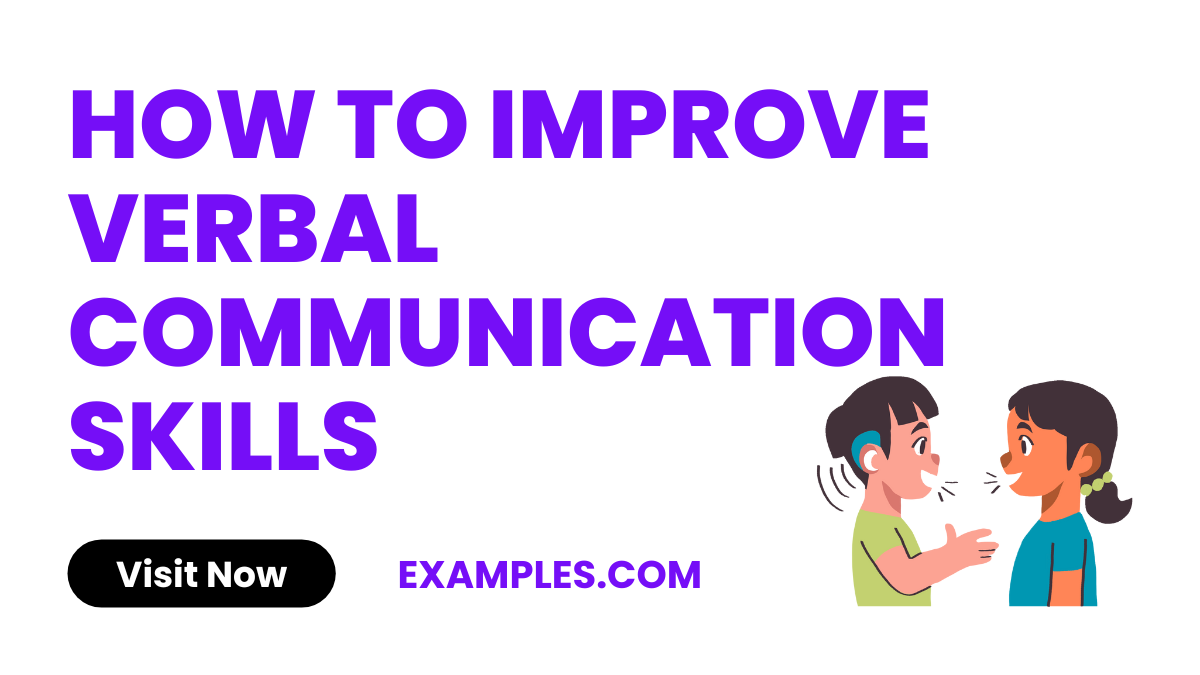How to Improve Verbal Communication Skills?
Unlock the power of effective dialogue with this essential guide on How to Improve Verbal Communication Skills. Packed with Communication Examples, this resource is your key to mastering the art of conversation. Whether it’s in professional settings, personal relationships, or everyday interactions, discover the strategies that will make you a more compelling communicator, helping you to express yourself clearly, understand others more deeply, and build stronger connections.
Download How to Improve Verbal Communication Skills Examples PDF
How to Improve Verbal Communication Skills? – Meaning

Improving verbal communication skills involves enhancing the way you convey and receive messages through spoken language. It includes developing clarity, empathy, and effectiveness in all aspects of speaking and listening. Understanding and practicing Verbal Communication Examples can lead to more meaningful interactions, reduced misunderstandings, and better relationships both personally and professionally.
20 How to Improve Verbal Communication Skills Examples

Explore the multifaceted ways to enhance your verbal communication with our detailed guide, featuring 20 unique examples. Delve into the essence of What Percent of Communication is Verbal? and refine your dialogue with varied Verbal Communication Techniques. Discover the Advantages and Disadvantages of Verbal Communication, understand the core Functions of Verbal Communication, and familiarize yourself with different Types of Verbal Communication. With these Verbal Communication Skills insights, embrace the most effective Ways to Improve Verbal Communication Skills for personal growth and better interactions.
- Active Listening: Paying full attention to the speaker.
Cause: Lack of understanding. Fix: Practice full engagement, nodding, and paraphrasing. - Clear Articulation: Speaking clearly without mumbling.
Cause: Miscommunication. Fix: Slow down and enunciate each word carefully. - Effective Use of Pause: Controlling the pace of conversation.
Cause: Overwhelming listener. Fix: Intentionally pause for emphasis and comprehension. - Empathetic Language: Showing understanding and concern.
Cause: Emotional disconnect. Fix: Use phrases that express empathy and understanding. - Confident Tone: Speaking with assurance.
Cause: Perceived lack of authority. Fix: Practice speaking with a steady, firm tone. - Positive Phrasing: Using optimistic language.
Cause: Negative reception. Fix: Rephrase sentences to sound more positive and constructive. - Non-Verbal Cues: Enhancing words with body language.
Cause: Misinterpreted messages. Fix: Use gestures and facial expressions that align with words. - Feedback Seeking: Inviting others to respond.
Cause: One-sided conversations. Fix: Ask open-ended questions to encourage dialogue. - Vocabulary Expansion: Using a wider range of words.
Cause: Limited expression. Fix: Read more and practice using new words. - Adjusting to the Audience: Tailoring language and content.
Cause: Ineffective communication. Fix: Consider the listener’s background and adjust accordingly. - Mindful Listening: Focusing on the speaker without planning a response.
Cause: Missing key points. Fix: Stay present and avoid interrupting. - Expressive Intonation: Varying tone for interest.
Cause: Monotonous delivery. Fix: Practice modulation to emphasize key points. - Conciseness: Being brief yet comprehensive.
Cause: Overwhelming information. Fix: Practice summarizing thoughts succinctly. - Humor: Lightening the mood when appropriate.
Cause: Tense interactions. Fix: Include light, appropriate humor to ease tension. - Storytelling: Engaging listeners with narratives.
Cause: Disengagement. Fix: Share relevant stories to illustrate points vividly. - Clarification Requests: Ensuring understanding.
Cause: Misinterpretations. Fix: Regularly check in for understanding and clarify as needed. - Cultural Sensitivity: Respecting diverse backgrounds.
Cause: Misunderstandings. Fix: Learn about and incorporate culturally respectful language. - Honesty: Being truthful in communication.
Cause: Mistrust. Fix: Cultivate a habit of honest, transparent dialogue. - Respectful Disagreement: Expressing differing opinions politely.
Cause: Conflict. Fix: Use ‘I’ statements and focus on issues, not individuals. - Regular Practice: Continuously developing skills.
Cause: Stagnation. Fix: Engage in varied speaking situations to build fluency and adaptability.
How to Improve Verbal Communication Skills in the Workplace
Elevate your professional interactions with a strategic focus on How to Improve Verbal Communication Skills in the Workplace. In today’s diverse and fast-paced business environment, effective communication is crucial. From Verbal Communication in Business to teamwork, discover how enhanced dialogue can lead to better collaboration, conflict resolution, and overall productivity. Master the art of professional expression and become a pivotal communicator at your workplace.
- Precise Language: Use specific and clear language to avoid misunderstandings. “Please submit the report by 3 PM today.”
- Active Listening: Show engagement and understanding in conversations. “I see your point, and to add to that…”
- Constructive Feedback: Offer feedback that is specific and actionable. “Your report was well-written; adding more data might enhance its impact.”
- Regular Team Meetings: Facilitate open communication within teams. “Let’s discuss our project progress and any roadblocks you’re facing.”
- Professional Tone: Maintain a respectful and professional demeanor. “I appreciate your effort; let’s work together to resolve this issue.”
How to Improve Verbal Communication Skills in the Interview
Make a lasting impression in your interviews by honing How to Improve Verbal Communication Skills in the Interview. Interviews are a critical moment to showcase not just your qualifications but also your ability to Verbal Communication for School effectively. From articulating your experiences to engaging with the interviewer, learn how to convey confidence, clarity, and professionalism with every word you speak.
- Concise Responses: Answer questions directly and succinctly. “I improved sales by 20% through targeted marketing strategies.”
- Positive Language: Use optimistic and proactive language. “I am excited about the challenges and opportunities this role presents.”
- Personal Stories: Share relevant experiences that highlight your skills. “In my last role, I led a team to successfully meet all our project deadlines.”
- Question Preparation: Be ready with questions that show interest and insight. “Could you tell me more about the team I’ll be working with?”
- Follow-Up: Express appreciation and interest in next steps. “Thank you for this opportunity; I look forward to possibly contributing to your team.”
How can Individuals Assess their Current Level of Verbal Communication Skills to Identify Areas that Need Improvement?
To elevate interaction quality, individuals must first assess their current Verbal Communication for Students, pinpointing areas ripe for enhancement. Recognizing Why you need Verbal Communication Skills and the Importance of Verbal Communication is the first step in a journey toward more impactful exchanges.
- Self-Reflection: Reflect on past conversations and identify moments of misunderstanding or discomfort.
- Feedback Collection: Actively seek feedback from peers, friends, or mentors on your communication style and effectiveness.
- Recording and Reviewing: Record your speaking engagements, then critically review to identify areas of strength and improvement.
- Comparative Analysis: Compare your Communication Style with proficient communicators, noting differences in clarity, tone, and engagement.
- Professional Assessment: Consider workshops or courses with Communication Assessments to get an expert evaluation of your skills.
What are Effective Strategies to Improve Verbal Communication Skills?
Enhancing verbal communication is essential for personal and professional development. Adopting effective strategies is key to upgrading the way we interact, understand, and are understood, all under the guiding principles of the Rules of Verbal Communication.
- Active Listening: Cultivate the habit of truly listening to understand, not just to respond, to improve engagement and response quality.
- Vocabulary Expansion: Broaden your word range for more precise and varied expression, making conversations more engaging and effective.
- Empathy Expression: Infuse your communication with empathy, understanding the emotional undercurrents for a more connected and respectful dialogue.
- Public Speaking Practice: Regularly practice public speaking or join groups like Toastmasters to enhance confidence and clarity in various communication settings.
- Constructive Feedback: Embrace and act on constructive feedback, viewing each piece as an opportunity to refine and evolve your communication style.
How do Cultural Differences Influence Efforts to Improve Verbal Communication Skills?
Cultural differences impact verbal communication styles, expressions, and interpretations. Understanding these can guide effective, respectful communication and Verbal vs Written Communication adaptation across cultures.
What Role Does Feedback Play in the Process of Improving Verbal Communication Skills?
Feedback is crucial for recognizing areas of improvement and success in verbal communication, guiding personalized development strategies, and refining both Verbal vs Oral Communication skills.
How can Active Listening Help Individuals Improve their Verbal Communication Skills?
Active listening fosters understanding, reduces misunderstandings, and improves responsiveness, enhancing overall verbal interaction and empathy in communication.
Improving verbal communication skills is vital for personal and professional growth. By actively assessing one’s abilities, embracing cultural diversity, seeking feedback, and practicing active listening, individuals can enhance their interaction quality. Embracing these strategies leads to clearer, more effective, and empathetic communication, positively impacting every aspect of life from personal relationships to professional success.



